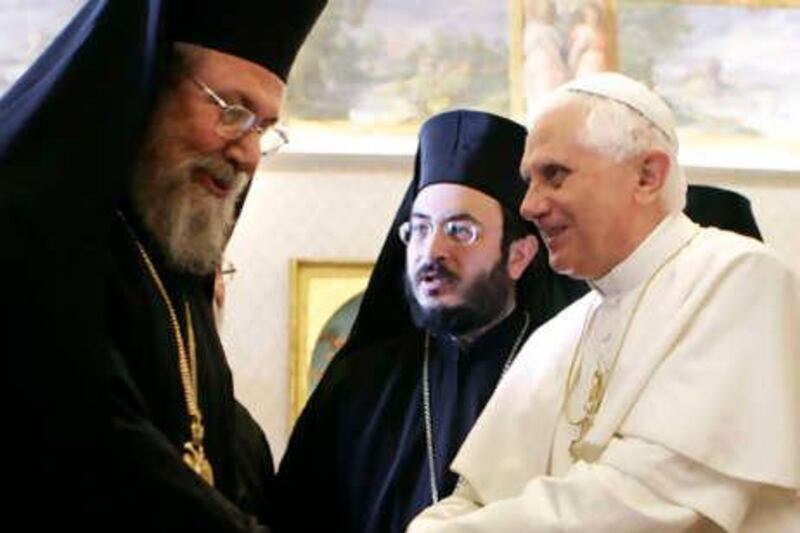NICOSIA // Pope Benedict XVI begins a historic visit to Cyprus tomorrow that highlights the island's strategic location as a bridge between West and East, a role it has long cherished. Cyprus is a centuries-old "crossroads of cultures and religions", Father Federico Lombardi, the Vatican spokesman, said. It was the "first stop on the first missionary journey" by St Paul the apostle, whose footsteps the German pontiff will retrace. "Peace will be the key of this trip."
Catholic bishops from across the Middle East will join the Pope in Cyprus where he will give them a working document for a major forthcoming synod in Rome on problems facing Christians in the region. Stemming Christian emigration from the predominantly Muslim Middle East is a key concern, Catholic officials say. The document, known as an Instrumentum Laboris, expands on a January text that urges Christians and Muslims to face the threat of Islamist extremism together, Fr Lombardi told a news conference this week. Also recommended is strengthening communion between the region's Catholic and Orthodox's churches, other officials say.
The document is not due to be unveiled until Sunday but excerpts addressing the Palestinian issue were leaked by Italy's Ansa news agency on Tuesday. In these, the Vatican calls Israel's occupation of Palestinian territories a "political injustice imposed on the Palestinians". The occupation "makes daily life difficult for freedom of movement, the economy and social and religious life", according to the Ansa leak.
The 40-page document adds: "Some fundamentalist Christian groups cite the Holy Scriptures to defend the political injustice imposed on the Palestinians, making even more delicate the position of Arab Christians." Ansa's report came as Israel drew worldwide condemnation for a deadly commando raid on Monday against a flotilla of boats laden with humanitarian aid for the Israeli-blockaded Gaza Strip.
The Pope, speaking to pilgrims in St Peter's Square yesterday, urged a peaceful resolution to the current crisis sparked by the raid, but said he was concerned about prospects of Middle East peace. While expressing his sorrow for the victims of the violence, he also called on regional powers to improve conditions for Palestinians living in Gaza. Cyprus will be "the focal point of Christian efforts in favour of peace in the tormented region", George Poulides, the island's ambassador to the Holy See, told the Catholic website, Terrasanta.net.
Thousands of Catholics from the Middle East will make the short journey to the Mediterranean island to see Pope Benedict. Cyprus is a predominantly Orthodox country and the Pope's three-day trip also gives the two Christian faiths an opportunity to forge better relations. He was invited jointly by the Greek Cypriot president, Demetris Christofias, the EU's only Communist head of state, and Archbishop Chrysostomos II, the head of Cyprus's autonomous Orthodox Church.
Despite their differences, the two men view the Pope as a highly influential international figure who can help press for a solution to the island's 36-year-old division as he travels the world. They plan to give him a red-carpet welcome. Hundreds of Cypriot police, nevertheless, will be deployed to head off any possibility of unruly protests by fringe Orthodox groups opposed to the first papal visit to the island.
Archbishop Chrysostomos actively supports dialogue with Rome - and Fr Lombardi shrugged off opposition to the Pope's visit as "marginal". It is a sign of the importance Cyprus places on the Vatican's diplomatic clout that the small island with a population of less than a million has an ambassador to the Vatican as well as one in Rome. Pope Benedict, however, is not expected to make any overtly political statements on the Cyprus problem. The island was split along ethnic and religious lines in 1974 when Turkey invaded the north after a brief, Greek-inspired coup.
The leaders of Cyprus's estranged Greek and Turkish communities have been locked in negotiations since September 2008 aimed at reuniting the island under a federal system. "I don't think he [the Pope] will say anything [publicly about the Cyprus problem] because it won't be appropriate and he'll have a problem with the Turkish side," Archbishop Chrysostomos said in an interview. The Pope was nearly forced to cancel a trip to Turkey in 2006 after he linked Islam to violence during a speech in Germany that caused outrage in the Muslim world.
The Turkish Embassy to the Holy See expressed regret last week that the Pope will not visit northern Cyprus, where the self-declared Turkish Cypriot state is recognised only by Ankara. The Greek Cypriots head the island's only internationally recognised government. However, the Pope's mere presence - and in particular where he will spend his two nights in Cyprus - will highlight the island's division and the urgent need for a solution, church officials and diplomats said.
On visits, the Pope usually stays in the host country's Apostolic Nunciature. In Cyprus's case, this is a Franciscan friary attached to the sandstone-fronted Holy Cross church, situated by chance in the heart of the UN-patrolled buffer zone dividing Nicosia. It is surrounded on three sides by Turkish military forces. The Franciscan compound has fragrant flower gardens shaded by towering eucalyptus trees. But it overlooks derelict, bullet-pocked buildings, cordoned off by barbed wire and ageing sandbags: potent iconography of the island's frozen conflict that will be recorded by television cameras from around the world.
"It is a sore sight - painful," said Father Umberto Barato, the charismatic parish priest of the Holy Cross Church and the Vatican's chargé d'affaires in Cyprus. The Pope is not coming to solve the Cyprus problem, he said, but added in an interview, "his presence can give courage and a positive impulse to relations between the two sides". @Email:mtheodoulou@thenational.ae






